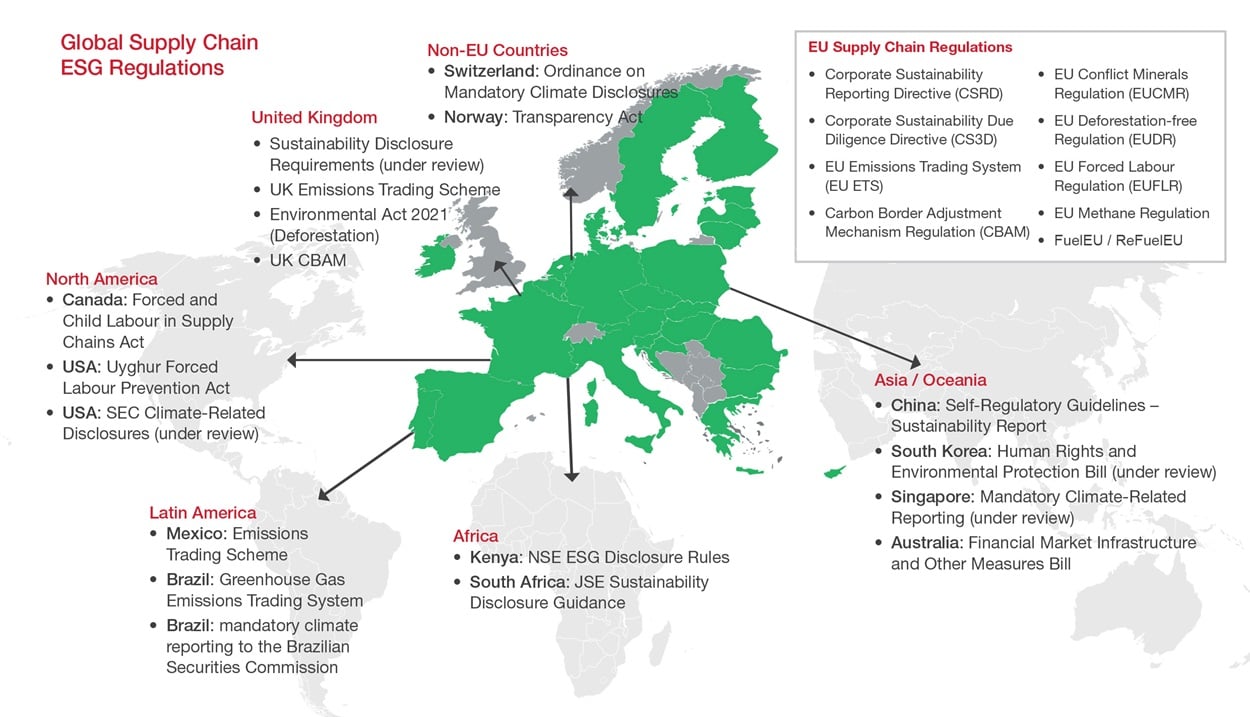Read time: 5 minutes
As international markets continue to grapple with the imperatives of climate change and sustainable development, pressure is mounting for regulatory responses to drive action. At the heart of this global trend is the surge in a broad range of sustainability-related regulatory changes – from transparency, reporting and supply chain due diligence requirements, to imposing direct financial costs aimed at pricing compliance and encouraging behavior that fosters an environmentally and socially sustainable global market.
The long arm of EU law
Possibly the most significant regulatory advances are being made by the EU with its command-and-control approach to ESG issues. The EU’s Green Deal is casting a wide net that stretches beyond its borders. Recent initiatives range from the market mechanisms CBAM and the EU ETS for pricing carbon, to the CSRD’s disclosure and transparency changes to the Accounting Directive, as well as requirements for supply chain due diligence under the CSDDD and the Forced Labour Regulation, to name just a few. Layered onto this are quantitative changes under FuelEU for maritime shipping emissions, ReFuelEU for aviation, the Renewable Energy Directive and wider environmental initiatives under the EU’s ‘Fit for 55’ scheme.
The cumulative effect of the EU’s various ESG and sustainability laws is to set a new benchmark for regulating the conduct of companies within and outside the EU to gain or maintain EU market access and harmonize standards. Many governments around the world are looking to adopt the EU’s drive for regulatory controls, seizing the opportunity to regulate sustainability while supporting clean technology development and building in-country capacity to future-proof certain sectors. What does this all mean for the transportation sector?
The transportation sector is likely to find itself deeper in the eye of the regulatory storm. The “long arm” effect of EU laws is reaching through the entire length of supply chains, extending the EU’s extraterritorial reach and catching the transportation sector.
The EU Green Deal is significantly impacting the sector through its focus on global supply chains by promoting sustainability, transparency and innovation. Its influence is driving other countries to adopt similar regulations, creating a ripple effect that aims to encourage responsible business practices worldwide.
Stakeholders are also demanding deeper and more transparent disclosure of corporate engagement when evaluating, monitoring and addressing environmental and social risks and impact management. This is creating a complex regulatory landscape where participants in the transportation sector must navigate multiple overlapping frameworks. As an integral part of the complex and interlinked global supply chain, facilitating global trade means that the transportation sector must secure and maintain both the environmental and social licenses needed to operate.
This does also presents opportunities - for advancements in technologies, upgrading transportation infrastructure and innovating solutions to future-proof (and climate-proof) the sector. Sustainable aviation fuels, electrification of ground transportation, upgrading maritime vessels and port infrastructure, low-carbon corridors and using AI for efficiencies are facilitating positive contributions the transportation sector can make for environmental and social sustainability.
- Changing the sector. The application of EU supply chain disclosure and reporting requirements is fundamentally reshaping the transportation sector, from low carbon emissions to biodiversity protection and human rights
- Increased regulation. The EU is reaching beyond its borders to meet the challenges presented by its international commitments, socio-economic factors and geopolitical pressures
- Competitive advantage. In this rapidly changing economic and regulatory climate, companies in the transportation sector that understand the regulatory landscape and implement due diligence frameworks will benefit from market opportunities presented by their enhanced capabilities and resilience

